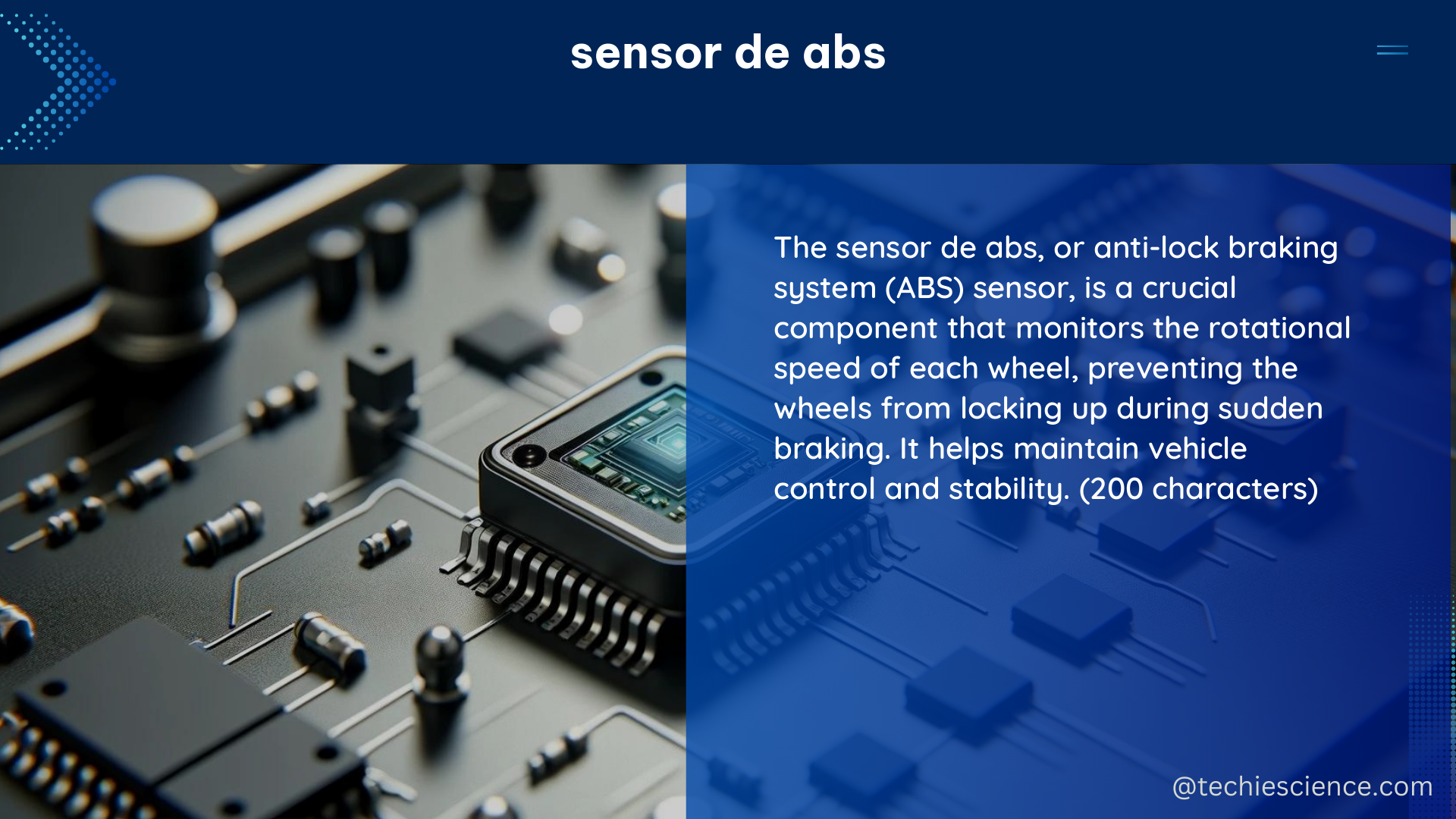The Antilock Braking System (ABS) sensor is a critical component in modern vehicles, responsible for maintaining stability and control during hard braking. This sensor measures the rotational speed of each wheel and transmits this data to the ABS control module, which then adjusts the braking force to prevent wheel lockup. Understanding the technical specifications, working principles, and troubleshooting procedures of the ABS sensor is essential for maintaining the safety and performance of your vehicle.
Understanding the ABS Sensor
The ABS sensor generates an analog voltage signal that varies with the wheel’s rotational speed. This voltage signal typically ranges from 0.5 to 4.5 volts, with the voltage increasing as the wheel’s speed increases. The ABS control module then converts this analog signal into a digital signal, which it uses to calculate the wheel’s rotational speed.
Technical Specifications
The technical specifications of the ABS sensor can vary depending on the vehicle make and model, but some common specifications include:
- Sensitivity: Around 20 mV/km/h
- Frequency Response: Up to 1 kHz
- Temperature Range: -40°C to +125°C
- Lifespan: Approximately 150,000 miles or 10 years, whichever comes first
Types of ABS Sensors
There are two main types of ABS sensors: passive and active.
- Passive Sensors:
- Rely on the vehicle’s wheel speed sensors to generate a signal
-
Less reliable and accurate than active sensors
-
Active Sensors:
- Use a separate magnet and coil to generate a signal
- More reliable and accurate than passive sensors
- Commonly used in high-performance vehicles
Testing the ABS Sensor

To test the ABS sensor, you can use a multimeter to measure the voltage signal generated by the sensor. The voltage should increase as the wheel’s speed increases and decrease when the wheel is stationary. If the voltage signal is outside the specified range or is not present, the sensor may be faulty and require replacement.
Using a Scan Tool
In some cases, the ABS sensor may be diagnosed using a scan tool that can display the sensor’s voltage signal and other relevant data. The scan tool can also provide diagnostic trouble codes (DTCs) that can help identify the cause of the problem.
Troubleshooting ABS Sensor Issues
When troubleshooting ABS sensor issues, it’s important to consider the following factors:
- Sensor Wiring: Check for any damage or loose connections in the sensor wiring, as these can cause signal disruptions.
- Sensor Mounting: Ensure that the sensor is properly mounted and aligned with the wheel’s rotation.
- Sensor Contamination: Check for any debris or corrosion that may be interfering with the sensor’s operation.
- Sensor Replacement: If the sensor is faulty, replace it with a new one that meets the vehicle’s specifications.
Conclusion
The ABS sensor is a critical component in modern vehicles, responsible for maintaining stability and control during hard braking. Understanding the technical specifications, working principles, and troubleshooting procedures of the ABS sensor is essential for maintaining the safety and performance of your vehicle. By following the guidelines outlined in this comprehensive guide, you can effectively diagnose and address any issues related to the ABS sensor.
References:
- SNAPS: Sensor Analytics Point Solutions for Detection and Decision – https://www.ncbi.nlm.nih.gov/pmc/articles/PMC6891700/
- ABS, TCS fault driving me insane – C1200 Code – https://www.newtiburon.com/threads/solved-abs-tcs-fault-driving-me-insane-c1200-code-fl-sensor-replaced-but-still-there.482523/
- Need insight | ABS, ESP, CEL| Lateral Acceleration Sensor, Camshaft Position Sensor – https://www.audiworld.com/forums/a8-s8-d3-platform-discussion-60/need-insight-%7C-abs-esp-cel%7C-lateral-acceleration-sensor-camshaft-position-sensor-2955666/
- Sensor-Generated Time Series Events: A Definition Language – https://www.ncbi.nlm.nih.gov/pmc/articles/PMC3478812/
- ABS sensor scooter & arduino – https://forum.arduino.cc/t/abs-sensor-scooter-arduino/422067

The lambdageeks.com Core SME Team is a group of experienced subject matter experts from diverse scientific and technical fields including Physics, Chemistry, Technology,Electronics & Electrical Engineering, Automotive, Mechanical Engineering. Our team collaborates to create high-quality, well-researched articles on a wide range of science and technology topics for the lambdageeks.com website.
All Our Senior SME are having more than 7 Years of experience in the respective fields . They are either Working Industry Professionals or assocaited With different Universities. Refer Our Authors Page to get to know About our Core SMEs.